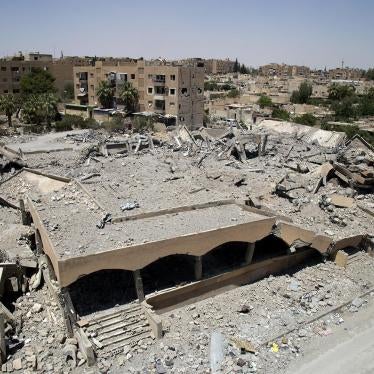(Beirut) – Oman joined the international treaty banning antipersonnel landmines on August 20, 2014, Human Rights Watch said today. It is the 8th Arab country and 162nd country worldwide to join. The move should encourage the remaining 11 countries in the Middle East and North Africa to join the Mine Ban Treaty and respect its provisions.
More than half of the countries in the Middle East and North Africa are affected by uncleared landmines and explosive remnants of war. New casualties caused by landmines and these explosive remnants were reported in 2012 – the most recent year for which complete information is available – in Algeria, Egypt, Iran, Iraq, Kuwait, Lebanon, Libya, Palestine, Syria, and Yemen.
“Oman has finally recognized that the long-term threat landmines pose to civilians far outweighs any military utility these weapons might provide,” said Sarah Leah Whitson, Middle East and North Africa director at Human Rights Watch. “Oman’s decision to relinquish these weapons sends a strong signal to other governments across the region that now is the time to join the landmine ban.”
The 1997 Mine Ban Treaty bans the use, production, transfer, and stockpiling of antipersonnel landmines and requires clearance of mined areas within 10 years as well as assistance to landmine victims. Treaty members include eight countries from the Middle East and North Africa – Algeria, Iraq, Jordan, Kuwait, Oman, Qatar, Tunisia, and Yemen, all European Union countries, all NATO members except the US, all nations in sub-Saharan Africa, all countries in the Western Hemisphere except Cuba and the US, many Asia-Pacific countries, and several nations from the Commonwealth of Independent States.
In March, Oman's foreign affairs minister, Youssef bin Alawi bin Abdullah, informed the Mine Ban Treaty envoy, Princess Astrid of Belgium, of the government’s decision to join the Mine Ban Treaty. Oman officially deposited its instrument of accession to the treaty with the United Nations in New York on August 20, 2014. The Mine Ban Treaty will take effect for Oman after a mandatory six-month waiting period.
Government officials have indicated that Oman has never produced or exported antipersonnel landmines, but it is believed to have imported and used them in the past. Oman will need to declare any stockpiled mines in its annual transparency report required by the Mine Ban Treaty. Oman is believed to have a small residual problem with uncleared landmines and unexploded ordnance dating from a conflict with a separatist group from 1964 to 1975. The problem is believed to be mostly in the Dhofar region in the south, but the precise extent of contamination is unknown.
Several of the Middle Eastern and North African countries that have yet to join the Mine Ban Treaty remain staunchly opposed to it, including former landmine producer Egypt, landmine producer Iran, and landmine users Israel and Syria.
But other non-signatories from the region have expressed interest. In December 2012, Palestine declared its strong desire to accede to the Mine Ban Treaty as soon as possible. It is now eligible to join. After abstaining on every annual UN General Assembly resolution urging countries to join the Mine Ban Treaty since 1997, Libya changed its position in 2013 to vote for the resolution. Morocco has stated that it voluntarily adheres to the treaty’s provisions and regularly participates as an observer in key meetings of the Mine Ban Treaty along with other non-signatories from the region – Bahrain, Lebanon, Saudi Arabia, and the United Arab Emirates.
Overall compliance with the Mine Ban Treaty’s provisions has been excellent, Human Rights Watch said. Since the treaty came into force on March 1, 1999, more than 47 million stockpiled antipersonnel mines have been destroyed, 27 countries have completed mine clearance to become mine-free, and the annual number of casualties from landmines and explosive remnants of war has decreased dramatically. Mine Ban Treaty states parties from the region that declared stockpiled landmines completed destroying them within the treaty’s four-year deadline.
Challenges remain however. In November, Yemen admitted that a “violation” had occurred in 2011 during the popular uprising that led to the ouster of then-President Ali Abduallah Saleh. This followed reports by Human Rights Watch and others that the former government’s Republican Guard forces laid thousands of antipersonnel mines in 2011 at Bani Jarmooz, near Sana’a, resulting in civilian casualties. As of June 2014, risk education has been provided to some of the local residents, but no mine clearance has been undertaken.
In March, a Human Rights Watch researcher was denied a visa to enter Yemen to investigate the steps the government is taking to address the 2011 landmine use. Under the Mine Ban Treaty, Yemen is obligated to mark the mine-affected area, warn the population of the danger, clear the mines and assist the victims. None of these measures are believed to have been taken despite Yemen’s acknowledgment and commitment to conduct an investigation into the landmine use.
Algeria served as president of the Mine Ban Treaty until the treaty’s Third Review Conference held in Maputo, Mozambique in June 2014. Jordan’s Prince Mired Raad Al Hussein is the Mine Ban Treaty’s special envoy, with responsibility for promoting universalization and implementation of its provisions.
Human Rights Watch is a founding member of the International Campaign to Ban Landmines, which received the 1997 Nobel Peace Prize, together with its coordinator, Jody Williams, for its efforts to bring about the Mine Ban Treaty and for its contributions to a new international diplomacy based on humanitarian imperatives.








